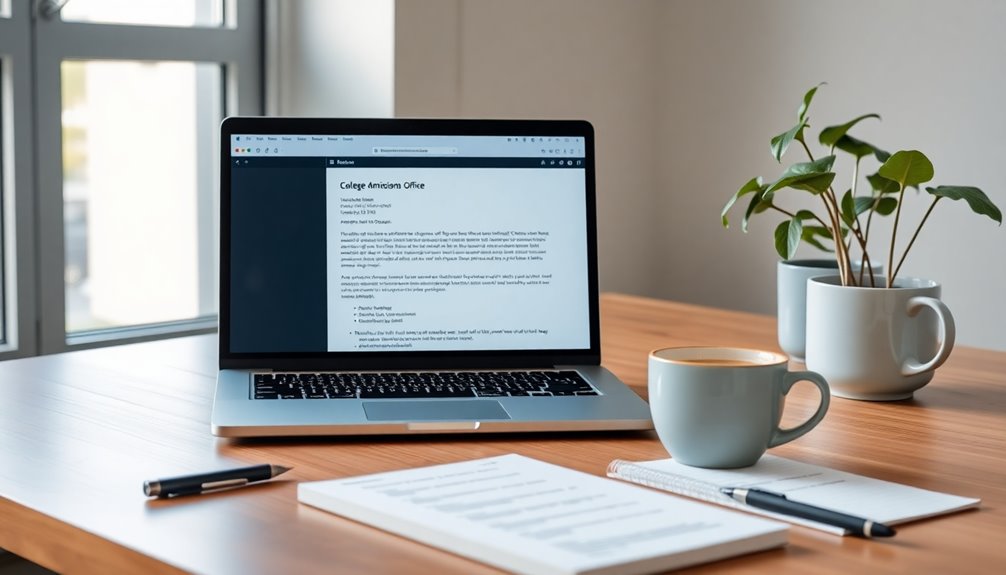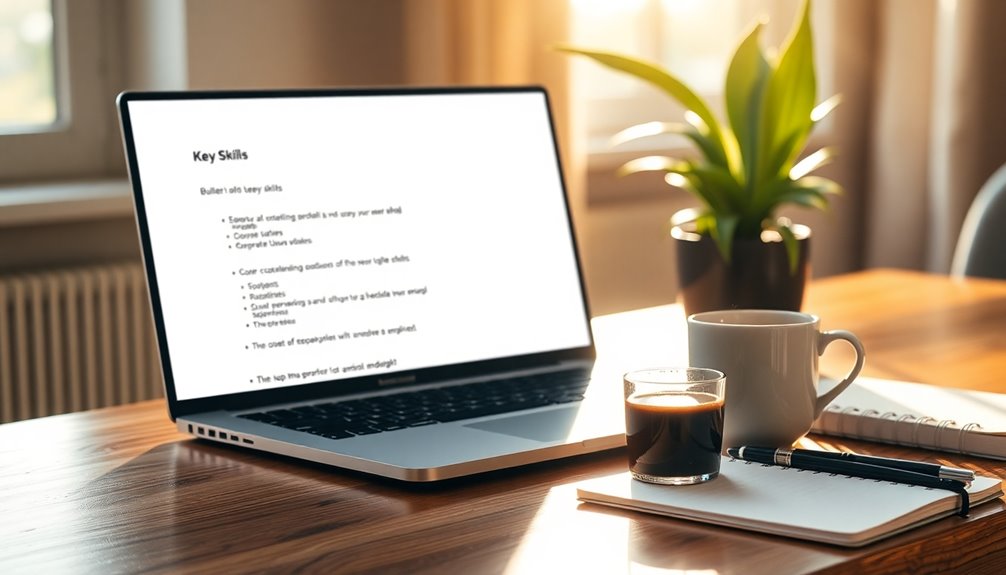To write an email to a college admissions office that gets answers, start with a professional email address and a clear subject line. Address the admissions officer formally, using their title, and introduce yourself as a prospective student. Keep your email concise, focusing on two or three specific questions that show your interest and understanding of the college. Avoid informal language and proofread your email to eliminate errors. Always express gratitude at the end to acknowledge their time. Following these tips will help you engage effectively, and there's more to explore to enhance your communication skills even further.
Key Takeaways
- Use a professional email address and a clear subject line to enhance credibility and ensure effective categorization of your inquiry.
- Address the admissions officer formally by their title and last name to show respect and enthusiasm for the program.
- Ask specific, researched questions that demonstrate your genuine interest in the college and its offerings.
- Conclude with a thank-you note to acknowledge the admissions officer's time and effort in responding to your inquiries.
- Follow up politely after one week if you haven't received a response, reiterating your interest in the program.
Introduction

When you're reaching out to a college admissions office, the introduction sets the tone for your entire email. To make a strong first impression, start with a clear subject line that reflects your purpose. For example, "Questions About Application Deadlines" shows you're organized and respectful of the admissions officer's time.
In your opening, introduce yourself as a prospective student and briefly state your interest in the college. This not only demonstrates your interest but also establishes a personal connection with the admissions officer. Keep it concise; you want to communicate clearly without overwhelming them with information.
Mention any specific research you've done about the college to show you're genuinely interested. Additionally, pose well-researched questions that invite detailed responses rather than vague inquiries. This approach encourages the admissions officer to engage with you more effectively.
Establishes Clear Communication Channels

Establishing clear communication channels with the admissions office can significantly enhance your chances of getting timely and relevant responses. When you send college admissions emails, make sure to include a specific subject line that reflects the purpose of your inquiry. This helps admissions officers categorize and prioritize your message effectively.
Always address the admissions officer appropriately. A formal tone shows respect and encourages a positive interaction.
In your email, it's crucial to ask specific questions. Concise questions demonstrate that you've done your homework and respect the officer's time, making it easier for them to provide focused answers.
Don't forget to include your full contact information. This ensures admissions officers can easily follow up or clarify any points, promoting effective communication channels.
A professional email address also adds to your credibility.
Personalized Greeting and Subject

A personalized greeting and a clear subject line are essential elements of your email to the admissions office, as they set the tone for your communication.
Begin by addressing the admissions officer by their formal title and last name, which shows respect and professionalism. This small touch creates a positive first impression and indicates your seriousness about the inquiry.
Next, craft a subject line that's clear and descriptive, like "Inquiry About Financial Aid Opportunities." This helps the admissions office categorize and prioritize your email effectively, increasing the chances of a timely response.
Take the time to research the appropriate admissions officer for your geographic region to ensure your email reaches the right person, enhancing the likelihood of receiving a prompt reply.
Personalizing each email for different colleges reflects genuine interest and distinguishes your correspondence from generic messages.
Remember, a well-crafted subject line and greeting can significantly influence the admissions officer's perception of your enthusiasm and seriousness about the application process.
Step-by-Step Guide to Emailing Admissions

Crafting an effective email to the admissions office involves a straightforward approach that ensures your message is clear and purposeful.
Start with a specific subject line that reflects your main inquiry, like "Question about Financial Aid Opportunities." Address the admissions officer formally, using their title and last name, and introduce yourself concisely with your name, school, and intended major.
In your concise email, state the purpose of your inquiry within the first few sentences. Limit your questions to two or three focused topics to keep the email manageable and direct.
Before reaching out, conduct thorough research on the college's website to ask specific questions that demonstrate your knowledge and genuine interest in the institution.
Conclude your email with a polite thank you, showing appreciation for their time and assistance. Make sure to include your full contact information, so it's easy for the admissions officer to follow up with you.
Dos and Don'ts for Admissions Emails

When reaching out to the admissions office, knowing the dos and don'ts can significantly enhance your communication.
First, use a professional email address and craft a clear subject line. This helps ensure your message gets taken seriously and categorized correctly. Address the admissions officer respectfully, using their proper title and last name, which fosters a professional tone.
Keep your email concise; limit it to two or three focused questions. This not only respects the admissions officer's time but also increases the likelihood of a prompt response.
Avoid using informal language, slang, or all caps, as these can create an unprofessional impression and detract from the seriousness of your inquiry.
Before hitting send, proofread your email for grammatical errors and clarity. Mistakes can reflect poorly on your attention to detail and professionalism.
Always strive for clarity in your writing to ensure your questions are understood without confusion. By following these dos and don'ts, you'll present yourself as a thoughtful and serious candidate, increasing your chances of receiving helpful answers to your admissions questions.
Examples of Inquiry Emails

Effective inquiry emails can make a significant impact on your communication with college admissions offices. When you write an email, start with a clear subject line that reflects your purpose. For example, "Question about Financial Aid Opportunities" immediately signals your intent to the college admissions officer.
In your opening paragraph, introduce yourself with relevant details, like your name, school, and intended major. This context helps the officer understand who you are.
Follow this with specific questions that show you've done your research. Avoid vague inquiries; instead, ask about particular programs or opportunities that interest you, demonstrating your genuine interest in the college.
Conclude your email with a thank you email expressing gratitude for the admissions officer's time and assistance. This fosters a positive impression and encourages a prompt response.
Don't forget to include your full contact information at the end of your email, making it easy for them to reply. Lastly, always proofread your emails before hitting send to ensure clarity and professionalism.
Pro Tips for Writing Effective Emails

To ensure your emails to the college admissions office stand out, focus on clarity and professionalism right from the start.
Begin with a clear and concise subject line that indicates your purpose, like "Inquiry about Financial Aid Options." This captures the admissions officer's attention immediately.
Address the admissions officer respectfully using their formal title and last name. This establishes a professional tone and shows respect.
In the opening paragraph, briefly introduce yourself by providing your name, school, and any relevant application status. This context helps the officer understand your inquiry better.
Limit your email to two or three focused questions that's relevant to your situation; this avoids overwhelming the admissions officer and encourages detailed responses.
For instance, if you're applying to the University, ask about specific deadlines or required documents.
Final Thoughts

Crafting a thoughtful email to a college admissions office can make a significant difference in your communication. Start with a clear subject line and a polite greeting, followed by a concise self-introduction to establish context. This sets a professional tone right from the beginning.
To enhance the likelihood of receiving detailed responses, demonstrate thorough research by asking specific, well-informed questions. Admissions officers appreciate when you show genuine interest in their programs.
As you wrap up your email, express gratitude for their assistance; this fosters a positive impression and encourages further engagement.
Maintaining professionalism throughout your email is crucial. Use proper titles, avoid slang, and ensure your language reflects respect for the admissions process.
If you haven't received a response within a week or two, don't hesitate to follow up politely. This reinforces your continued interest and professionalism, showing that you're serious about your college journey.
Frequently Asked Questions
How Do You Start an Email to a College Admissions Office?
When you start an email to a college admissions office, greet the admissions officer with their title and last name.
Introduce yourself by including your name, school, and application status to provide context.
Use a clear subject line that reflects your message's purpose.
In the opening sentences, state your main question or request concisely to respect their time.
Always express gratitude for their assistance to leave a positive impression.
Does Emailing Admissions Officers Help?
Yes, emailing admissions officers can definitely help. It shows your genuine interest in their college and allows you to ask specific questions about programs or requirements.
When you reach out thoughtfully, you create a connection that can be beneficial during the review process. Plus, clear communication can make it easier for them to respond without needing follow-up questions.
Engaging proactively can leave a positive impression and enhance your overall application.
How Do You Email College Admissions Follow Up?
When you're following up with a college admissions office, start by referencing your previous email to remind them of your inquiry.
Clearly restate your questions to make it easy for them to respond. Keep your tone professional and express appreciation for their busy schedule.
Use a straightforward subject line, like "Follow-Up: Inquiry About [Specific Topic]."
Lastly, keep your email concise to respect their time and increase your chances of getting a reply.
What to Say to a College Admissions Officer?
When you're reaching out to a college admissions officer, start by clearly stating your purpose.
Address them by name and mention something specific about the college that shows your genuine interest.
Ask well-researched questions to encourage detailed responses.
Remember to express gratitude for their time and assistance, as it helps build a positive rapport.









